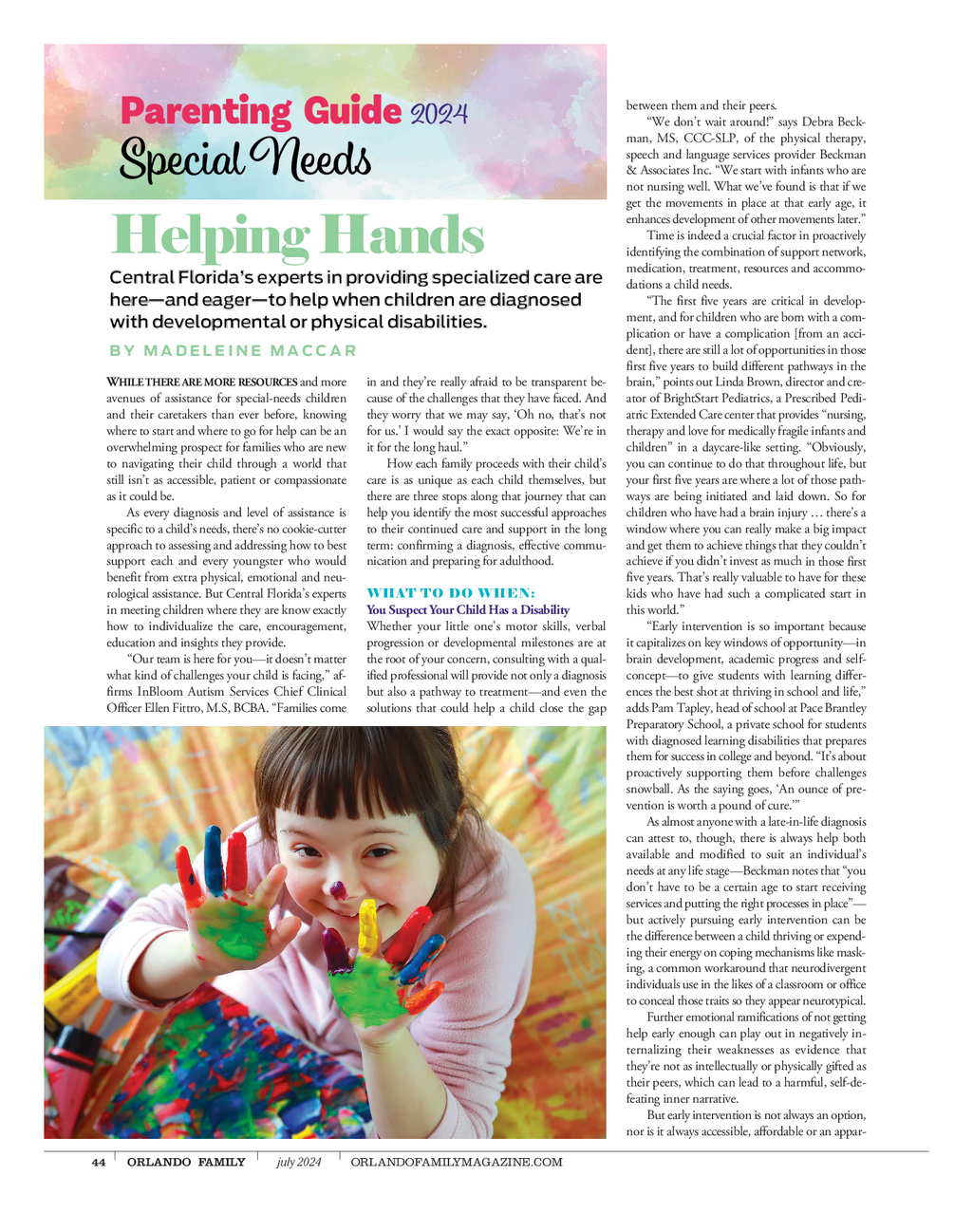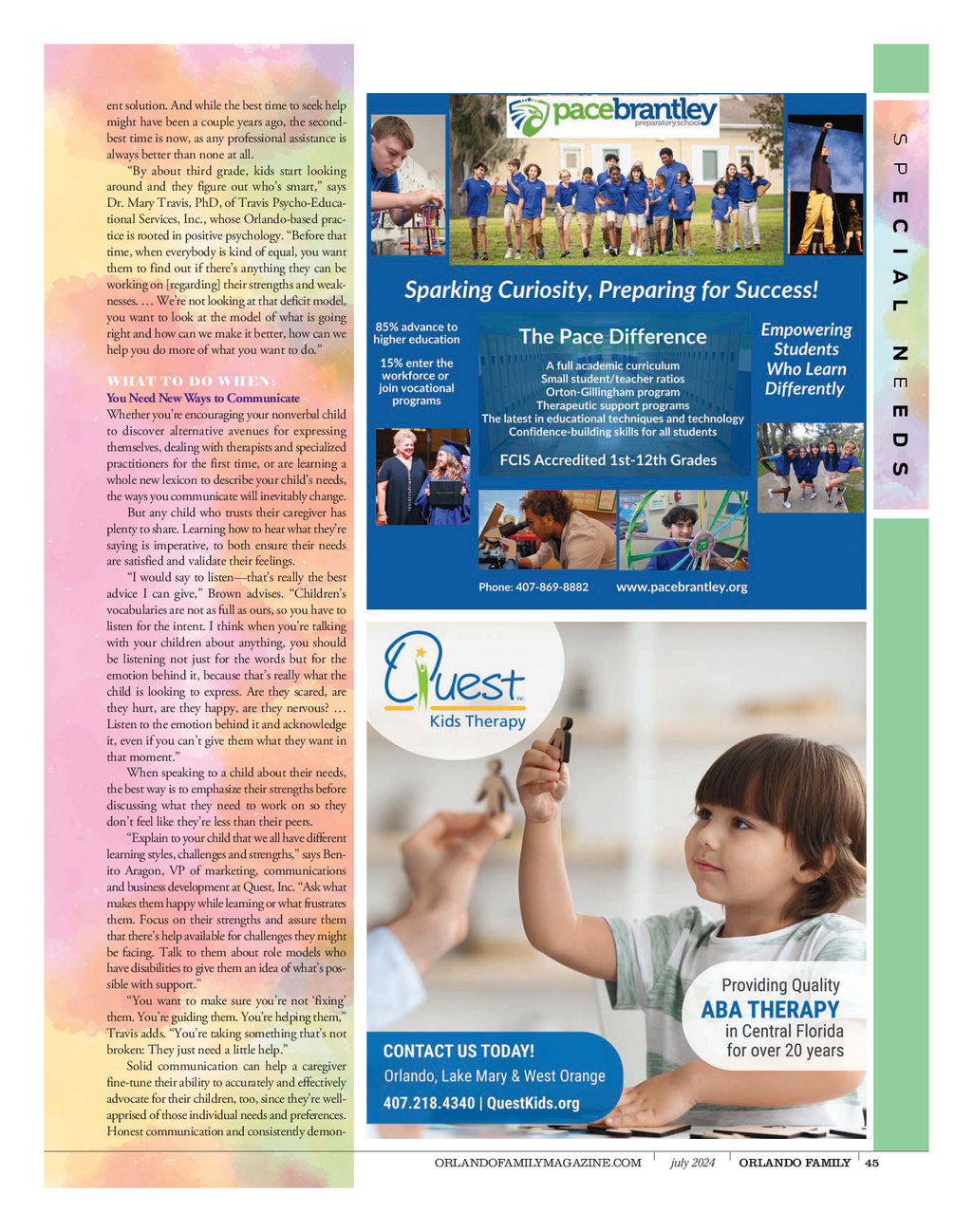OFM_PARENTING_GUIDE_724 - FINAL_Pages 6 / 13 / 24 5 : 02 PM Page 11 between them and their peers . Parenting Guide 2024 “ We don’t wait around ! ” says Debra Beck - man , MS , CCC - SLP , of the physical therapy , speech and language services provider Beckman SpecialNeeds & Associates Inc . “ We start with infants who are not nursing well . What we’ve found is that if we get the movements in place at that early age , it enhances development of other movements later . ” Time is indeed a crucial factor in proactively Helping Hands identifying the combination of support network , medication , treatment , resources and accommo - CentralFlorida’s experts in providing specialized care are dations a child needs . “ The first five years are critical in develop - here — andeager — to help when children are diagnosed ment , and for children who are born with a com - withdevelopmental or physical disabilities . plication or have a complication [ from an acci - dent ] , there are still a lot of opportunities in those BY MADELEINE MACCAR first five years to build different pathways in the WHILE THERE ARE MORE RESOURCES and more in and they’re really afraid to be transparent be - brain , ” points out Linda Brown , director and cre - avenues of assistance for special - needs children cause of the challenges that they have faced . And ator of BrightStart Pediatrics , a Prescribed Pedi - and their caretakers than ever before , knowing they worry that we may say , ‘ Oh no , that’s not atric Extended Care center that provides “ nursing , where to start and where to go for help can be an for us . ’ I would say the exact opposite : We’re in therapyand love for medically fragile infants and overwhelming prospect for families who are new it for the long haul . ” children ” in a daycare - like setting . “ Obviously , to navigating their child through a world that How each family proceeds with their child’s you can continue to do that throughout life , but still isn’t as accessible , patient or compassionate care is as unique as each child themselves , but your first five years are where a lot of those path - as it could be . there are three stops along that journey that can ways are being initiated and laid down . So for As every diagnosis and level of assistance is help you identify the most successful approaches childrenwho have had a brain injury … there’s a specific to a child’s needs , there’s no cookie - cutter to their continued care and support in the long window where you can really make a big impact approach to assessing and addressing how to best term : confirming a diagnosis , effective commu - and get them to achieve things that they couldn’t support each and every youngster who would nication and preparing for adulthood . achieve if you didn’t invest as much in those first benefit from extra physical , emotional and neu - five years . That’s really valuable to have for these rological assistance . But Central Florida’s experts WHAT TO DO WHEN : kids who have had such a complicated start in in meeting children where they are know exactly You Suspect Your Child Has a Disability this world . ” how to individualize the care , encouragement , Whether your little one’s motor skills , verbal “ Early intervention is so important because education and insights they provide . progression or developmental milestones are at it capitalizes on key windows of opportunity — in “ Our team is here for you — it doesn’t matter the root of your concern , consulting with a qual - brain development , academic progress and self - what kind of challenges your child is facing , ” af - ified professional will provide not only a diagnosis concept — to give students with learning differ - firms InBloom Autism Services Chief Clinical but also a pathway to treatment — and even the ences the best shot at thriving in school and life , ” Officer Ellen Fittro , M.S , BCBA . “ Families come solutions that could help a child close the gap addsPam Tapley , head of school at Pace Brantley Preparatory School , a private school for students with diagnosed learning disabilities that prepares them for success in college and beyond . “ It’s about proactively supporting them before challenges snowball . As the saying goes , ‘ An ounce of pre - vention is worth a pound of cure . ’ ” As almost anyone with a late - in - life diagnosis can attest to , though , there is always help both available and modified to suit an individual’s needs at any life stage — Beckman notes that “ you don’t have to be a certain age to start receiving services and putting the right processes in place ” — but actively pursuing early intervention can be the difference between a child thriving or expend - ing their energy on coping mechanisms like mask - ing , a common workaround that neurodivergent individuals use in the likes of a classroom or office to conceal those traits so they appear neurotypical . Further emotional ramifications of not getting help early enough can play out in negatively in - ternalizing their weaknesses as evidence that they’re not as intellectually or physically gifted as their peers , which can lead to a harmful , self - de - feating inner narrative . But early intervention is not always an option , nor is it always accessible , affordable or an appar - 44 ORLANDO FAMILY july 2024 ORLANDOFAMILYMAGAZINE.COM































































































































